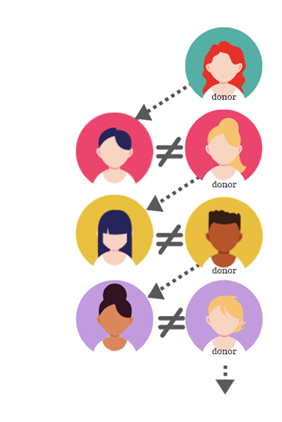What is a Kidney Donation Chain?
More than 90,000 people are in need of a kidney transplant, yet every year only about 6,000 people donate one of their kidneys. A kidney donation chain is a way of maximizing the number of kidney patients who receive a living donor kidney, while ensuring that all kidney recipients receive a donor kidney that is the best possible match.
A kidney donation chain is made up of pairs: a kidney patient in need of a transplant and a donor willing to donate a kidney on their behalf, but whose kidney is not a perfect match. The donor-recipient pair may be totally incompatible, it may be a poor match, or it may be a fairly good match with the potential to be better.
The only type of pair that will not be able to do better by participating in a kidney chain is a six-out-of-six sibling match. In these cases, the match can almost never be improved upon, so it makes more sense to proceed with a direct donation from that sibling to the other sibling.
Who Can Start a Kidney Donation Chain
Most kidney donation chains are started by Good Samaritan donors who want to donate a kidney but do not have an intended recipient—they do not care who receives their kidney, they just want to help someone.
This type of donation is also called non-directed donation or altruistic donation. It is sometimes referred to as anonymous donation because the donor is not known to the recipient and vice-versa, but the donor can choose to share their identity with the recipient of their donated kidney, and the two can communicate or meet if both agree to do so.
A kidney donation chain can also be started by someone who enters the National Kidney Registry’s Voucher Program, which allows a non-directed donor to donate when and where it is convenient for them and receive up to five vouchers for family members who are not in imminent need of a transplant.
With the Voucher Program, the donor can help someone in need a kidney immediately, while also looking out for their family in case one of them ever needs a kidney transplant. If one of the family voucher holders needs a kidney transplant in the future, they can redeem the voucher to receive prioritization for a living donor kidney through the National Kidney Registry.
How a Kidney Donation Chain Works

In a kidney donation chain facilitated by the NKR, the chain-starter donates their kidney to set the process in motion. Using the latest in DNA technology, the NKR finds a recipient who is the best match for the chain-starter’s kidney (Recipient 1) and safely transports the chain-starter’s kidney to Recipient 1’s transplant center for transplantation. The recipient can be in the same city or across the country—using advanced GPS technology and its Failsafe software, the NKR is able to safely transport donated kidneys to their destination anywhere in the United States.
Next, the donor who wanted to donate their kidney on behalf of Recipient 1 (Donor 1) donates their kidney, and again, the NKR finds the best matched recipient for that kidney (Recipient 2). Then Donor 2 donates their kidney, and that kidney is transplanted into a well-matched Recipient 3.
This chain can continue as long as there are donor-recipient matches. The longest kidney donation chain, recognized by Guinness World Records, was facilitated by the NKR and included 25 transplant centers and 70 surgeries over the course of three months, resulting in 35 kidney patients who received live-saving transplants. Read more about the longest kidney donation chain in the world.
All donors who donate as part of an NKR-facilitated kidney donation chain are covered by Donor Shield, a comprehensive suite of protections including cost reimbursement for lost wages, travel and lodging and dependent care, as well as coverage for complications, legal support and more. To see all Donor Shield protections, visit the Donor Shield website.
The video below explains how kidney donation has evolved from single donor-recipient pairs through paired kidney exchange and now to kidney donation chains.
For more information on becoming a living kidney donor, visit https://www.kidneyregistry.com/for-donors/am-i-qualified-to-donate-a-kidney/